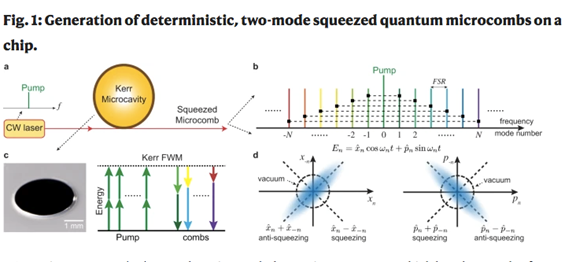UVA research group accelerates quantum computing in real-world conditions
Estimates are that the quantum computing market will reach $65 billion by 2030. A research team led by Xu Yi, assistant professor of electrical and computer engineering at the University of Virginia School of Engineering and Applied Science created a scalable quantum-computing platform that reduces the number of devices needed to achieve quantum speed on a photonic chip the size of a penny.
The results, published in Nature Communications recently published the team’s experimental results, A Squeezed Quantum Microcomb on a Chip. Yi’s photonics-based approach is promising because a field of light is also full spectrum; each light wave in the spectrum has the potential to become a quantum unit. Yi hypothesized that entangling fields of light would achieve a quantum state.
millimeter-sized structure that envelopes the photons and generates a microcobe device that efficiently converts photons from single to multiple wavelengths. Light circulates around the ring to build up optical power. This power buildup enhances chances for photons to interact, which produces quantum entanglement between fields of light in the microcomb.
Through multiplexing, Yi’s team verified the generation of 40 qumodes from a single microresonator on a chip, proving that multiplexing of quantum modes can work in integrated photonic platforms.
Yi’s multiplexing technique opens a path toward quantum computing for real-world conditions, where errors are inevitable. Yi’s photonics-based system offers two additional advantages in the quantum computing quest. Quantum computing platforms that use superconducting electronic circuits require cooling to cryogenic temperatures. Because the photon has no mass, quantum computers with photonic integrated chips can run or sleep at room temperature. Lee fabricated the microresonator on a silicon chip using standard lithography techniques, which implies the resonator or quantum source can be mass-produced.
Original Release: Eureka Alert

